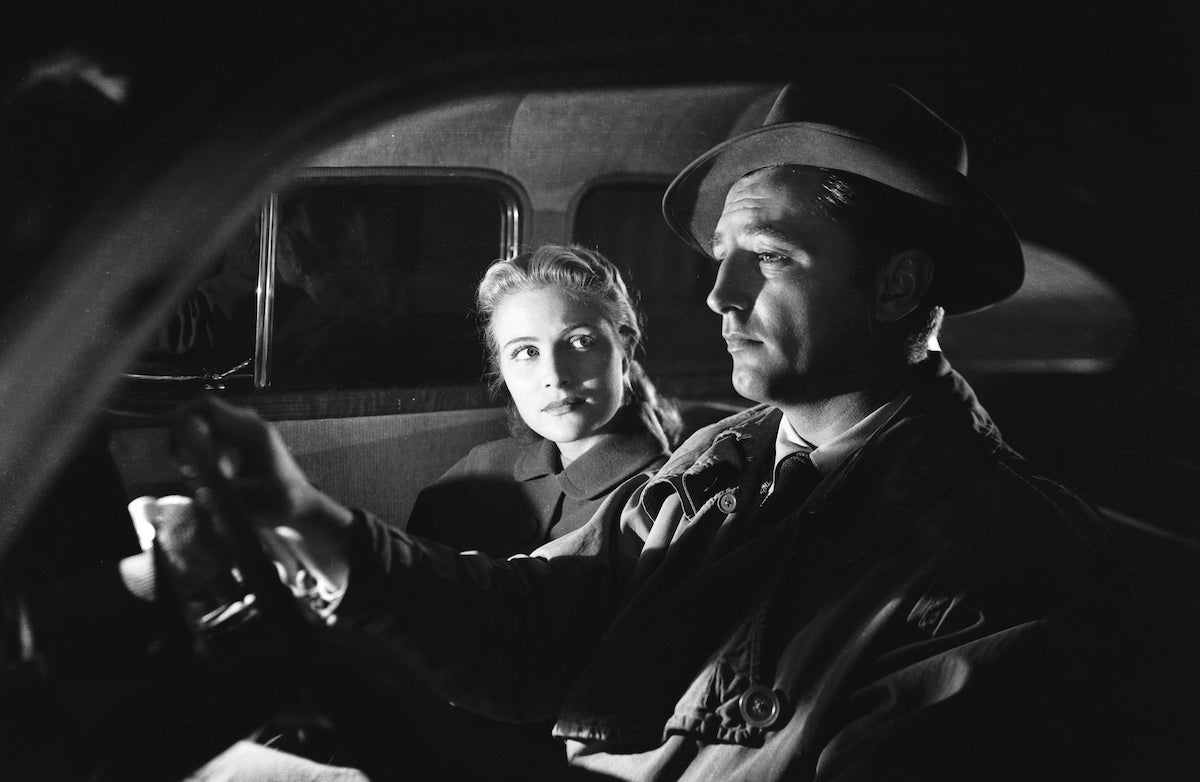Classic film noir wanted to reveal to America the depth of the problem of ambitious men in a democracy through crime stories—detectives, criminals, and victims caught in the quest for justice after the quest for happiness leads to catastrophe. Vengeance often turns out to be more reliable than love. I’ve already talked about The Maltese Falcon and The Killers, where these roles are separated—now I turn to Out of the Past, where all three are one.
The modern detective is not always a rationalist like Sam Spade; he can become a romantic, which is the attraction of Robert Mitchum, who became a star with Out of the Past, because he seemed tough and ordinary, but had a very sensitive face that encouraged women especially to take to him. He’s a down-on-his-luck private detective in New York who gets a job from mobster Kirk Douglas to track down the girlfriend who shot him and ran with his ill-gotten gains. This leads to romance south of the border, Acapulco to be exact, where the writ of American law doesn’t run, indeed where the forces of nature, an unrelenting sun and monsoon storms, seem all-powerful and all human contriving comparatively petty. That romance, however, turns deadly when the woman betrays him and Mitchum ends up a romantic mess in a small town trying to find love again with a nice girl, only for his past to catch up with him.
The distinction between the sophisticated and the innocent is important in all these movies, but it shows up in different ways. In The Maltese Falcon, the femme fatale pretends to be a finishing school naif, too rich to deal with sordid realities, in order to trap men who are lower class but worldly-wise into underestimating her. In The Killers, it’s small-town America, outside the metropolis, where the innocent or simple unexpectedly face sophisticated, wicked men who make a sport of cruelty.
Out of the Past sharpens this distinction between New York and San Francisco, on the one hand, and what we call, rather shamelessly, flyover country, between an older, more virtuous America and a modern, metropolitan, and ruthless America, much more calculating and a perfect home for organized crime, but also more interesting dramatically and urgently of interest politically. This resembles the distinction between America and Mexico, but is different. Mexico presents the hero with the illusion of romantic love, of a regained innocence that reduces life to passion, doing away with all uncertainty. Small-town America requires boring, steady work, some measure of respectability only grudgingly afforded, and keeping one’s word rather than losing one’s head. Its horizons are narrow, the strange complexities of human nature show up only in gossip.
Mitchum acts the part in all three different ways of life, moving from one to another as detective, criminal, and victim, which suggests part of what’s wrong with him: He isn’t really at home anywhere, he doesn’t know himself—at his worst he almost seems a tourist. More seriously, he wants things that cannot go together for him, and yet some vision of what a man should amount to makes him think he might pull it off and become great. So he cannot quite let go of his ambition to achieve something by his wit, which America makes difficult or impossible, nor can he overcome the suspicion that the rot is so deep in modern society that the only thing a just man can do is run away.
Confronted with the mobster Douglas, Mitchum accepts the job offered, but feels himself to be and acts the criminal’s equal. He may have no authority, as a mere private detective, indeed a worker for hire given his poverty, but he wants to be his own man. Getting paid by a devious mob boss is a kind of victory in itself—he’d succeed where the criminal has failed and find the girl. Finally, he’d be able to live well with that money, instead of becoming rotten. Virtue of a kind, personal integrity at any rate, would overcome a vicious intelligence.
Once in Mexico, Mitchum feels that, since he was a nobody in America, he might as well disappear here. Love will guarantee him a private identity and, as a stranger, he has no obligations to a community. But of course, the sordid life he left behind won’t allow such freedom—men who envy his superiority want to bring him down, either to profit by his fall or to prove to be his better, his former partner in the detective business and his former employer and his henchman, respectively. Only inasmuch as people want him humiliated or dead do we begin to see that there really is something noble and heroic in Mitchum’s detective, setting him apart from the criminal underworld, which shows up first of all as naivety or fearlessness, an inability or unwillingness to dig a man’s grave.
Mitchum learns, as all noir heroes do, that manliness, with its straightforward promises and beautiful visions, is not enough. He becomes pensive and turns to confession. Sam Spade in The Maltese falcon, without quite being able to say why, explains himself to the woman he loves and whom he nevertheless has to send to jail. He wants to be known in a surer, more intimate way than his deeds allow, given the ambiguity of public life and the lies people tell to authorities. The Swede, in The Killers, explains himself to a cellmate in jail, the only place he finds honesty, trying to understand what love is and why he’s unhappy, without being able to liberate himself from that passion. Mitchum’s Jeff confesses his dark past, which he’s trying to escape, to a small-town girl, as though her judgment were honest, not the indulgence of a woman in love. He needs someone to believe in him, he needs love to prove he is not reducible to the crimes in which his circumstances and choices involved him. He would rather be a victim than a hero.
This explains his love for the seductress played by Jane Greer, who seems sweet and sophisticated, honest and calculating by turns. She notices immediately his unhappy desire to serve, and she fulfills his fantasy of a carefree life of passion, gaining a superior man, a fearless man. Their criminal romance collapses because his fearlessness and his love for her come into conflict when they are exposed by his former detective partner, whom he cannot bring himself to kill. This is not an accident—he was always going to return to his noble character and thus endanger this deadly woman, who cannot afford to take risks. He wants her to share in his fate, to beautify the America he grew up in.
In the sequence of the movie told in flashbacks, his confession in effect, Mitchum’s private eye is a fool who tries to steal from a thief—the mobster’s money and Greer’s love. His naive pursuit of glamorous, risky happiness, however, has a certain depth, or at least reveals his underlying fatalism, the consequence of being brought up in an unhappy, unjust city. He tells this story as he prepares to return to the city, becoming an avenger, involved in the destruction of every one of the criminals, now bitter and calculating, but unable even to think of saving himself. The past comes back to doom him when his former lover and his former mobster employer are trying to frame him for murder, as payback for his having escaped their clutches. He knows this but steps into the frame anyway, concerned only with learning what evil deed they’re plotting and taking revenge. He feels guilty or else he wouldn’t even try to attain some form of justice.
Director Jacques Tourneur builds the film’s complicated structure—flashbacks and action—on an accident: A mobster finds Jeff, under an assumed name in a gas station in a small town, like the Swede in The Killers. This is irony. America is a land of mobility, of cars, but these broken heroes are stuck in gas stations fueling the cars of people with lives to live and somewhere to be. But dramatically, it’s not an accident, since only the life of crime and vengeance makes Jeff interesting. Nor is it an accident politically: Someone has to defend the virtues of small-town America from the newly spreading corruption. The movie shows the mob moving to Lake Tahoe, polluting with the city’s cruelty and luxury the pristine wilderness and those quiet, uneventful lives. Small-town America is still the measure of morality, which modern people need to learn. Modern, urban America, so vulnerable to organized crime and glamorous deceptions, needs to learn about justice, which in turns needs the experience of betrayal, wickedness, and heartbreak—how else can ordinary life be defended from glamorous delusions and the profiteering they feed?

